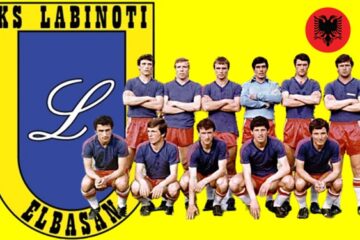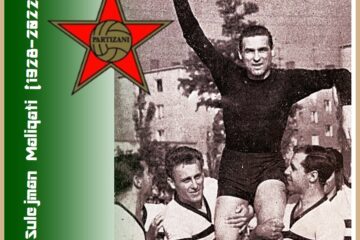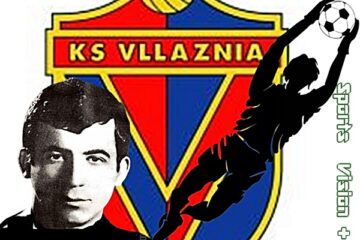Anton Mazreku (1908 – 1969) | Prominent figure, the father of sports journalism!
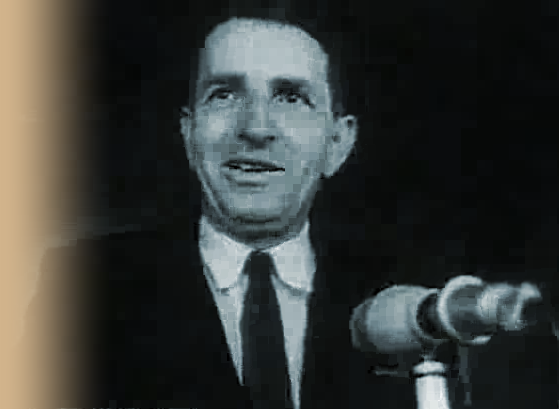
Anton Mazreku (6 May 1908 – August 1969)
About the book “Anton Mazreku, the word, the silence”
An article by Skifter Kellici
As soon as you hear the name of Anton Mazreku, you immediately remember the great sports commentator of Radio Tirana and the founder of the newspaper “Sporti Shqiptar”, which continues to be published today under the name “Sporti”. But there are very few who know that Anton Mazreku, apart from the comments he made from our stadiums around and other European countries, apart from the reports from the football matches through newspapers, starting from 1925, he was also a writer, poet and translator. even talented one.
This is proven by the book “Anton Mazreku, the word, the silence”, prepared by her daughter, Adelina, and his daughter’s husband, Shefqet Xhiku.
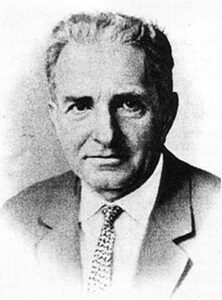 A book with more than 400 pages, divided into four parts “Roads” (journalistic), “This is how men die” (prose and poetry), “Right and freedom” (translated prose and poetry) and finally ” The magician of the microphone”, (others about Anton Mazrek”).
A book with more than 400 pages, divided into four parts “Roads” (journalistic), “This is how men die” (prose and poetry), “Right and freedom” (translated prose and poetry) and finally ” The magician of the microphone”, (others about Anton Mazrek”).
I will not dwell on the values of Anton Mazreku in the sports field, because it has been made known by the readers through the sports press. But it should be noted that, when he was only 17 years old, started writing in more than 10 different newspapers at the time such as “Brezi i Ri”, “Zani i Populli”, “Sporti”, which were published in Shkodra, in the early 20s of the last century, to be published during the years of study at the French High School in Korce, in “Gazette e Korces”, “Besa”, “Shkolla Kombetare”, “Posta e Korces”, “Drita”, “Kombi” and of course, “Albanian Sport”, which he directed it (1935-1939) as well as in other magazines.
Even, as evidenced by his family, Anton Mazreku started his activity as a journalist with the “newspaper” of the house, with articles that he placed on a table, which he hung in the living room, when he was only 11 years old.
Without wanting to make comparisons, I too, in 1949, when I was the same age, I made a kind of sports newspaper , which I hung at the top of an alley in our neighborhood, on “Siri Kodra” street in Tirana, and I, like Mazreku, I started publishing articles in 1954, when I was 16 years old, and I published my first story in 1958 at the age of 20…
But, between me and my teacher and then my colleague, Anton Mazreku, there is a big difference in the microphone, because at that age, his writings, as evidenced in the pages of this book, both journalism and even more literary creations, have more maturity, experience, artistic level, than the creations that I published at that time. For this, it is enough to mention a few titles; “Time and I”, “The need for the well-being of children” “About malaria”, “A trip to Tirana”, up to “The world situation”, where he analyzed what was happening in the world in 1925…
These are writings to witness the broad horizons of this 17-year-old boy, who would show his talent at that age in a poem entitled “The Son and the Mother”, where he tells about a boy who takes crooked paths and forgets his parents and homeland .
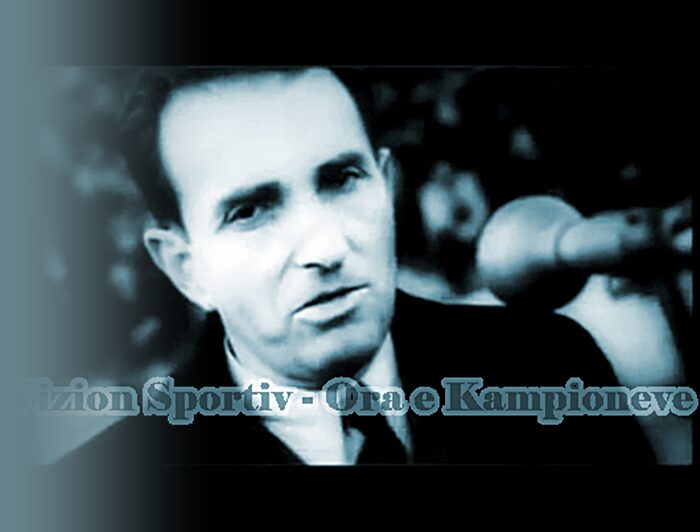
Mazrek’s poems, which he continued to publish in this genre even later, are permeated by love and longing for his homeland, as it seems they were written when he happened to be, for various reasons, far from his birthplace:
“The boat is going over poured oil,
On a calm sea illuminated by the moon,
Inside a boy, so strongly poisoned,
With tears he waits for a cursed steamer…”
Or: “My poor mother is missing,
It’s no use calling her child ,
For nothing begged for a wine,
For nothing was bathed in tears and oil.
He was influenced by his years of study at the Korce High School. And it must be said that they were conceived with a high artistic level. Unlike poetic creativity that is permeated by lyrical notes, in prose Mazreku deals with historical topics written in rich, catchy language, which helps him to create shocking passages, as happens in the stories “Thieves”, “Two Tragic Deaths” and especially in the story “This is how men want”, which describes the heroic death of Vlad, a brave mountaineer who, along with his friends, fights against the Turkish invaders.
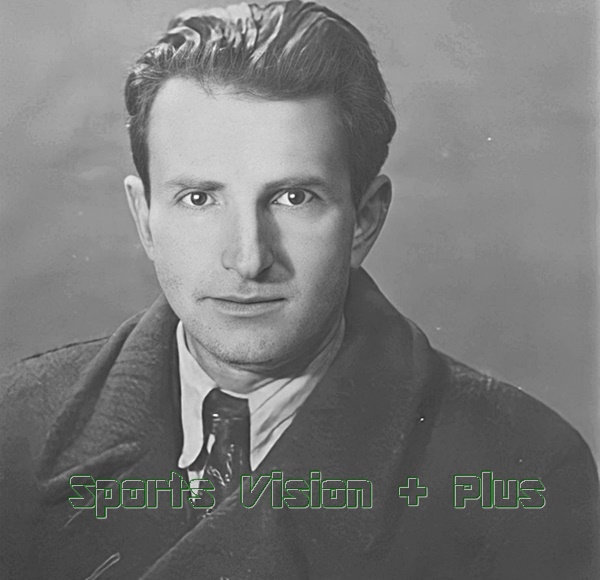
In this volume, a fairy tale entitled “The language of animals”, which would be a worthy part of any volume of fairy tales that could be published in the future, as well as the short stories “Little White, ” Desert Gypsies”, written with pain, which remind us of the stories and sketches of “Migjeni”. And in this case, I must point out that Anton Mazreku, not only followed the creativity of our great poet, but also valued it very much. the article titled “National education lost four precious daughters within these two months” also proves it, where, among other things, it is written: “He died far from his homeland, in a foreign country.
In the last episodes of his short life, he would have wanted and maybe he would have written his masterpiece, but “the dead raised his hands like gold” and Migjeni’s last song was closed in the grave together with him, as an illustration, he uses these immortal verses of Migjeni:
“Oh, you sleep, my relics,
You have not yet touched any foreign heart,
Only I am satisfied with you like a child.
I your cradle, maybe your tomb”.
In the articles he wrote, Mazreku also mentions Naim Frasheri, De Rada, Mjeda, Fishta… And strangely, in a sports report entitled “You saw Lushta and Borici”. It is the word for the impressions he had during the football match between Lazio and Juventus, which took place in Rome in 1940, where our two great footballers, Borici from Shkodra and Lushta, of Kosovar origin, played against each other respectively in the above teams at the end of the report he writes:
“Where is Riza Lushta walking…. he puts his hand on his forehead to see the black clouds, which pour thick drops of rain and make the soil of the field dry, I remember the lines of “Lahuta “, of our immortal poet, father Gjergj Fishta: “Riza Pasha goes to the castle, / Great God, what did you see, / The fog fell, / At Rzhanice, under Podgorica…”. Someone can say: “What does poetry have to do with sports? It does, even strongly. As for sports, that’s poetry too…”
And precisely because he regarded sport as poetry, he has created such striking literary figures, whether in sports writings or during the commentary of football matches on the microphone, such as: “Piles of colorful jerseys in the penalty area”, “The ball passes through a labyrinth of legs and rests in nets”, “The stadium is wrapped by a gray veil of fog…”, and others like these.
Anton Mazreku also proves that he is also a talented translator. Armed with a very good knowledge of French, Italian, but also German, he translated prose and poetry of the most famous poets of the 19th century, such as Heine, Schiller, Leopardi, Shenie, Ronsar…
Even , the well-known researcher, Prof. dr. Jup Kastrati, in an article included in this volume, claims that the poem: “Lorelei” by Hajnes, translated by Mazreku, is more beautiful than the same poem, first translated by Arshi Pipa and then, years later, by Lasgush Poradeci.
Anton Mazreku’s literary creativity stopped in 1944, when he was 36 years old and when he proved that he could create even better works, both in prose and poetry. Yes, what prevented him from continuing to write, why was he silent and limited himself to writing only sports articles?
Maybe because he devoted himself entirely to his work in the Albanian Football Federation and his activity as a journalist and sports commentator on the Radio?
No, because he spent the same amount of time when he was the director of the newspaper “Sporti Shqiptar”, in the mid-30s. The reason is deep. Apparently, he did not agree with the principles of socialist realism that suppressed the freedom of expression and creativity of our writers, after the establishment of the communist system. He did not agree with the leader Enver Hoxha, his friend throughout in his school years at the Korce High School, began to exercise and decided to remain silent in the literary field.
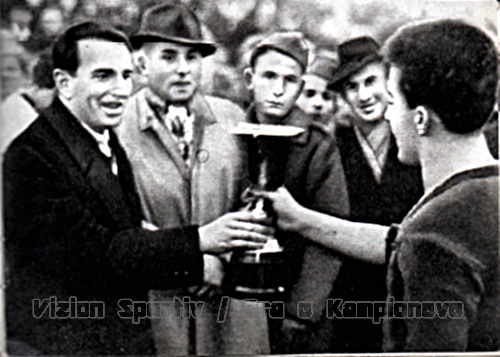
Mazreku hands to Vllaznia the Cup of the first Albanian Football Championship – 1945
He didn’t want to write, as he wrote maybe commissioned, a poem or sports march for the First National Spartakiad (1959), where we come across verses like:
“Our flags are flying,
Our song is loud,
The Party gave us light
“He gave us life, he gave us health”, a typical, plagiarism poem of the 50-60s, before the talent of Kadare, Arap, Agolli… who gave a different face to our poetry.
Anton Mazreku worked for several years as a teacher and then in the sports organizations under the Ministry of Education and Culture, until, suddenly, he was taken out of early retirement in 1966, when he was 57 years old, because, although he was not told openly, he belonged.. “generation of old intellectuals”.
Back then, it was rumored that he was the director of a sports newspaper, so… an official of the Zogist regime! . . .
And, however, in the pages of this newspaper, he has not infrequently made such bold and bold calls, such as the one I am quoting below: “The main fault that we are not progressing in sports is not the sports councils, let alone of course, it is not the people who have suffered, but the upper classes of the country are to blame before anyone, the ministers, the deputies, the rich, our universities, the intellectuals. (“Our duty towards sports associations”, October 17, 1937).
If Anton Mazreku had published this article, with such a heartfelt sound, in the years of the communist regime, where poverty was never removed from the Albanian hearths that were warmed by the “sun of the Mother Party”. Enver Hoxha, that is his friend, would have given the bullet to the head, like many other intellectuals, without trials, as in October 1944, where he ordered to be shot, except for 35 intellectuals. also three of their high school friends, or more with fabricated trials.
However, he avoided Mazreku, the master of the word, -as his daughter, the well-known doctor Adelina, pointed out in the foreword of the book, but also of silence towards any personal injustice, or any absurd attack” towards that part of the production of his intellectual…”
Not only that, but after the unexpected and untimely death, on August 2, 1969, Enver Hoxha, who in such cases sent condolence telegrams even to distant shepherds, because he had met them by chance during the war years, as evidenced in his book “Yours Enver”, he did not bother to send Anton Mazrek’s family two more letters, for the friend of his youth.
The book “Anton Mazreku, the word, the silence”, is an insight into the creativity of the activity, the sports commentator and now also the writer and the poet, as it is suddenly revealed to us in this book. It would have been good if it included articles, like the one I mentioned above, a panoramic article that he wrote together with me, entitled “20 years of Albanian football” in no. 5, 6 of the “Ylli” magazine, 1964, and in the last part, “Others for Anton Mazrek”, where friends and colleagues, well-known figures in the sports field, recount a story that I dedicated to him in 1969, including in the volume “The grey steps”, published the same year, but after his death, and a fragment from my novel “Tirana two hours before the sentence”, (1998), dedicated to the shameful exclusion of November 17 from the red dome in 1967, only that this team was not declared champion, where Anton Mazreku is one of the main characters, alongside Enver Hoxhe, with retrospectives from the Korce High School years.
Finally, it would be appropriate for the Ministry of Culture, Youth and Sports a promotion of this book, because it belonged to sport, youth, as much as it belonged to literature, as we saw in this article, and art, culture.
Above all, the activity of Anton Mazrek, presented in this book, should to be reflected in the programs of Radio Tirana and Albanian Television, all the more so since this year coincided with the 40th anniversary of his death, just like last year with the 100th anniversary of his birth, when these institutions are silent, because with his special voice since 1938 from the football fields, as I pointed out at the beginning of this article, he became unforgettable by the listeners of many generations.
Better late than never!…
Published on December 05, 2009 From USA,
Skifter Kellici
_____________________
Sports Vision + / The Champion Hours since 2013
Discover more from Sports Vision +
Subscribe to get the latest posts sent to your email.


